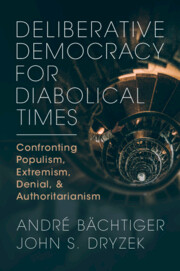 Deliberative Democracy for Diabolical Times
Deliberative Democracy for Diabolical Times Book contents
- Deliberative Democracy for Diabolical Times
- Deliberative Democracy for Diabolical Times
- Copyright page
- Contents
- Preface
- 1 An Introduction for Diabolical Times
- 2 Deliberation for Realists and Skeptics
- 3 Democracy in a Diabolical Soundscape
- 4 How to Deliberate with (and against) Populists
- 5 How to Deliberate with (and against) Extremists
- 6 How to Deliberate with (and against) Deniers
- 7 How to Deliberate with (and against) Authoritarians
- 8 How to Deliberate with Everybody
- 9 How to Renew a Deliberative Democracy
- References
- Index
4 - How to Deliberate with (and against) Populists
Published online by Cambridge University Press: 28 March 2024
- Deliberative Democracy for Diabolical Times
- Deliberative Democracy for Diabolical Times
- Copyright page
- Contents
- Preface
- 1 An Introduction for Diabolical Times
- 2 Deliberation for Realists and Skeptics
- 3 Democracy in a Diabolical Soundscape
- 4 How to Deliberate with (and against) Populists
- 5 How to Deliberate with (and against) Extremists
- 6 How to Deliberate with (and against) Deniers
- 7 How to Deliberate with (and against) Authoritarians
- 8 How to Deliberate with Everybody
- 9 How to Renew a Deliberative Democracy
- References
- Index
Summary
Right-wing populism has been widely implicated in the destabilization of democracy in traumatic events such as the presidency of Donald Trump. Chapter 4 examines the cultural, economic, and communicative aspects of populism and its origins, addressing arguments for including populist parties and leaders more effectively in conventional party politics, before moving on to a deliberative response. It may be possible to engage citizens attracted to populism (though not leaders) in deliberative terms. Populist leaders can be demagogues uninterested in abiding by democratic norms of any sort, least of all deliberative ones, though it might be possible to induce somewhat better democratic behavior on their part. Populist citizens are more promising in deliberative and democratic terms because some of their concerns and insecurities have a reasonable core: society really is dominated by an elite, just not the one that populist leaders stress. This core could be reached by deliberation, however much its concerns have been more effectively exploited by demagogues to date. Discursive psychology can be deployed in thinking about deliberative bridges to populist citizens. Populist citizens may be attracted to democratic innovations such as deliberative mini-publics. Contestatory deliberation involving democratic activism can counter populist leaders.
Keywords
- Type
- Chapter
- Information
- Deliberative Democracy for Diabolical TimesConfronting Populism, Extremism, Denial, and Authoritarianism, pp. 87 - 110Publisher: Cambridge University PressPrint publication year: 2024
